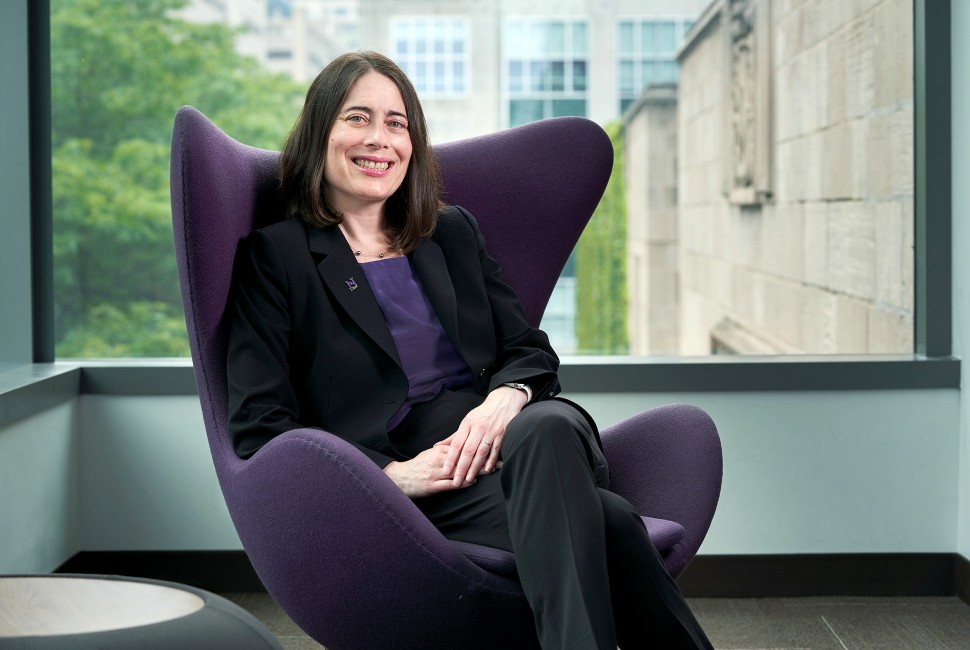Hari M. Osofsky, dean of Northwestern Pritzker School of Law and Myra and James Bradwell Professor of Law, keeps a few mementoes on the bookshelf behind her desk to remind her of who she is and what she values. One is a holiday greeting from a former student, which reminds her of the long-term difference one can make through mentoring people.
“I realized that students with different identities were hearing seemingly neutral advice about clerkships differently,” Osofsky said. “I helped three of my students who were women of color form a support group and successfully apply. This card meant a great deal to me because this student remembered the advice that ‘you can’t get any job you don’t apply for’ in deciding to apply ambitiously for her next job. It reinforced that our interventions can have lasting impact beyond that moment.”
Osofsky has been deeply involved in efforts to diversify legal academia, academic leadership and the profession throughout her distinguished career as a lawyer and academic, which began with a clerkship for one of her most important mentors — Judge Dorothy Wright Nelson — after her graduation from Yale Law School in 1998. Nelson served as the first female dean of the University of Southern California Law School and one of the first female federal appellate court judges.
Now, Osofsky herself is a leader who has served as the dean of two law schools and of a school of international affairs. Her tenure at Northwestern Law began last fall. At the end of her first academic year here, Northwestern Now sat down with Osofsky at her office on the Chicago campus to hear her plans for the future of the Law School.
What have you found to be special about the Northwestern Law community?
I have been particularly grateful for all the ways our community has come together and supported each other through the challenges of this year. While many schools talk about their sense of community, I hear consistently from our alumni and current students about the unusually strong and supportive community that we have here.
I am even more excited than when I started, because I think we are not only a great law school with tremendous strengths but also a high potential one. Our law school has a longstanding innovation tradition, and this is a moment that could not need innovation more. We have an important opportunity to make an impact as we build our next chapter.
Where do you see this law school going in the future?
We are working strategically on four main aspects of innovation for impact. First, we need to prepare our students to lead in a rapidly changing legal environment and learn from our pivots. I am creating a working group of students, faculty, staff and alumni to explore our next innovation opportunities.
Second, we have an opportunity to build upon our existing strength in interdisciplinarity; over half of our faculty are J.D.-Ph.D.s and we have innovative interdisciplinary programs. We have opportunities to grow our joint appointments across the University and collaborate more in interdisciplinary partnerships that impact the world. I created an associate dean for innovation and partnerships to help us build those connections across the University.
Third, we need to continue to make progress on diversity, equity and inclusion (DEI). It’s incredibly important that our work be concrete rather than performative. Finally, we have a longstanding commitment to advancing social justice. Our Bluhm Legal Clinic has an important impact while also training students, and we are thinking strategically about its next steps.
You’ve made progress on DEI a priority. What are some steps you’ve taken in this area?
On my second day here, we launched a major HR Initiative in collaboration with the University to ensure that we are consistently approaching promotions, raises and bonuses across the organization. It is critical that we create a supportive growth environment for employees at the Law School and engage in best practices. We also are ensuring that all our faculty searches follow best practices, including an equity representative on the search committee and building a robust and diverse pool at each stage.
Another concrete step we've taken in response to student input is creating a new mental health position in the Law School. We worked closely with the University to ensure that the person would be full-time, and that the position description would include a preference for someone with expertise in racial trauma counseling.
I’m also excited that we’re honoring Professor Joyce Hughes, who has had a pathbreaking impact on legal education and the profession, by creating a new endowed scholarship in her honor; naming and dedicating a faculty corridor of the Law School after her; and holding a symposium on the impact of African American women on legal education. Professor Hughes was the first Black woman to be tenured in any department at Northwestern University and retired recently.
Talk more about how you see the Law School innovating in the social justice space.
We’re in the process of developing an initiative to boldly try to address access to justice by creating a national model in Chicago. According to a Legal Services Corporation report, 86% of low-income people who need civil legal services receive no services or inadequate services. For people with criminal law claims, the Supreme Court case Gideon v. Wainwright helps ensure some needed representation, but there are important gaps there, too.
So, we've been thinking about the fact that we have Northwestern Law alums everywhere that might matter when it comes to trying to address this problem in Chicago — in legal services; every major law firm; the offices of the mayor and governor; and major corporations. Our clinic is also one of few that has social workers in it. By using an interdisciplinary approach, leveraging technology and thinking critically about the role of lawyers, we’re aiming to bridge the access to justice gap.
Why is interdisciplinary collaboration more important than ever in legal education?
Addressing the major issues facing society requires interdisciplinary solutions. This is particularly important at the law-STEM interface. Law often deals poorly with fast-moving science and technology, whether in the context of climate change and energy, health or cybersecurity, because the people who create laws don’t have enough training in the relevant science, and scientists and business leaders may lack a complete understanding of the legal context.
I have seen this problem directly in my work on climate change and was very grateful to take climate change science as part of my Ph.D. coursework in geography. It helped me understand that the issues of scale I was grappling with in the context of multi-level governance were also an issue at the interface of science and law.
That’s one of the reasons that our Master of Science in Law program — which is among the first in the country — is so important. By training STEM professionals in a mix of law, business and technology, we can help create the integrated knowledge that we need as a society to solve big problems.
What message would you like to leave with graduates?
I have two messages for graduates. First and foremost, I want to say how proud we are of them and how excited we are to celebrate this milestone with them. They’ve had to overcome significant challenges during their time in law school, and I’m very proud of the support for one another and resilience that they’ve shown. Second, I want them to know that they give me hope for the future. They are going to be our next generation of lawyer and professional leaders, and whatever career path they choose, they have an opportunity and obligation to advance justice and access to justice.


